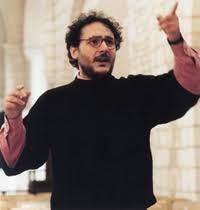
Strictly speaking, the CD title “Mozart Overtures” is a misnomer, and rarely have I been so happy to discover a misleading label. One overture after another can make for fatiguing listening, no matter how indisputable the quality of the music and performances. The principal reason for them is to serve as a curtain raiser in a drama, although naturally Mozart elevated the form as he did for nearly everything he touched. There are only so many attention grabbers one’s ear can fully absorb in the space of an hour.
 All of the concert favorites are here, but they are wisely and generously interspersed with overtures from lesser-known operas, and more important, 10 other brief instrumental movements from operas both famous and obscure. With rare exceptions, I’m not in the habit of listening to a succession of short movements with little or no relationship to each other (we have pop music for that), but this thoughtfully assembled and bracingly performed collection is hard to resist.
All of the concert favorites are here, but they are wisely and generously interspersed with overtures from lesser-known operas, and more important, 10 other brief instrumental movements from operas both famous and obscure. With rare exceptions, I’m not in the habit of listening to a succession of short movements with little or no relationship to each other (we have pop music for that), but this thoughtfully assembled and bracingly performed collection is hard to resist.
In the notes, maestro Rinaldo Alessandrini acknowledges an agreement with Nicolas Harnoncourt that tempos should not be exaggeratedly fast, a tenet he exhibits in the overture (actually, labeled “Sinfonia” by the composer) to Le nozze di Figaro. Granted, Mozart marked presto in the score, but the prevailing practice has been to spin this most renowned of overtures into a mad blur. Here the conductor adopts a rapid pace, but not so fleet that the snaking opening melody loses it characteristic sinewy contours. Has any composer ever written music that is as simple yet sublime as the Marcia from the same opera? Here it is dispatched with dignity, simplicity, and grace.
The most noteworthy trademark of these readings is Alessandrini’s predilection for highly detailed phrasing, an approach that works well with the fairly small forces he employs. Marsch der Priester flows with an intoxicating lyrical grace, the aching suspensions gently underlined. Occasionally he reaches a bit too far, as in the Overture to Der Schauspieldirektor, a work squarely in Mozart’s mature period, yet little known to modern audiences. Perhaps the conductor overdoes his interpretation in order to give this rare gem a boost.
The popular Idomeneo has four excerpts on the disc, tied for the lead with the relatively obscure Mitridate. The Overture is delivered with stern briskness, the Marcia is more understated than most works in its genre, but Alessandri’s account of the Passepied crosses the line from subtle to sedated. “Pas seul de Monsieur Legrand” struts with spot-on nobility. There are four overtures to Mitridate, though no explanation in the notes is given for this oddity. Recordings of the opera only contain one overture in the usual spot, so perhaps the composer was not fully satisfied with his first couple of attempts.
I have long held the view (contentious in some circles) that most historically informed practices can be reproduced with modern instruments, a postulate demonstrated decisively in the recording. Balances favor the woodwinds and percussion, a tendency that has become the norm in recent years, and one that suits most of this music well. There is a buoyancy to the readings of the Norwegian National Opera Orchestra that is enlivening and clear-eyed. Of course, some have little regard for historic investigations, favoring larger orchestras, greater attention to legato phrasing, and string saturation. Thankfully, their numbers are dwindling, and fresh performances like this one will continue to thrive. The sound engineering is well suited to the interpretations, with a dryish but clear acoustic.--FANFARE: Michael Cameron
cd info
flac, scans

 y fine ballet recordings, of which this Giselle is one, have been great additions to the catalog. He has said that Adolphe Adam is his favorite composer, and this recording bespeaks great affection on Bonynge's part. It is uncut, the first time I have heard the score this way, plus with a few common interpolations by other composers. The orchestra (Royal Opera House Orchestra Covent Garden) plays with tenderness or gusto as required. The early digital 1986 sound engineering holds up pretty well, with good detail and dynamic range, and with only a touch of steeliness to the violins. Because of the Urtext attributes of this recording, it would be very hard to recommend another in its place. As good as some of the highlights recordings are of Giselle, the full score really demands to be heard, especially in such a fine performance. --David Seaman
y fine ballet recordings, of which this Giselle is one, have been great additions to the catalog. He has said that Adolphe Adam is his favorite composer, and this recording bespeaks great affection on Bonynge's part. It is uncut, the first time I have heard the score this way, plus with a few common interpolations by other composers. The orchestra (Royal Opera House Orchestra Covent Garden) plays with tenderness or gusto as required. The early digital 1986 sound engineering holds up pretty well, with good detail and dynamic range, and with only a touch of steeliness to the violins. Because of the Urtext attributes of this recording, it would be very hard to recommend another in its place. As good as some of the highlights recordings are of Giselle, the full score really demands to be heard, especially in such a fine performance. --David Seaman




